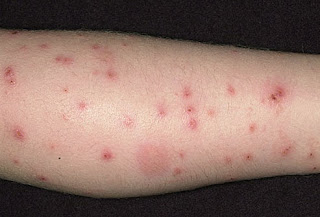Summer is here, the season of outdoor activities, and since
mosquitoes tend to multiply in hot climates, summer is also the season of bug
bites. Whether it is a mosquito bite or a bee sting, spraying your skin sticky
with offensive-smelling bug repellants is only going to make you uncomfortable
and possibly keep humans away from you as well. When I was a kid, my
grandfather made my brother and I slather cotton balls in regular yellow
Listerine and rub it on every part of skin that was showing before we were
allowed outside. Thankfully, there are other natural remedies that keep the
bugs—or if you have already been bitten—the sting and itch away.
Probably the safest way to keep bugs away from your home is
to prevent your yard from inviting bugs. You can plant little repellent gardens
all over your yard, front porch, or back patio to ward off unwanted bugs. Using
nature-friendly plants like lemongrass (also known as Citronella, popular in
mosquito-repelling candles), lemon thyme, catnip, and citrus-smelling geraniums
which contain up to 60 percent of the power of popular spray DEET along with
other commercial products, you can reduce your family’s bite ratio and reduce
the amount of toxins they are subject to.
Another option is lotions and sprays found at natural health
food stores or herbalists thar contain essential oils and herbs that are used
to keep these pests away (like eucalyptus, bay laurel, thyme, or lavender). One
of these natural oils, gaining in popularity, is neem oil. Made from the neem
tree, this extract is used in Indian Ayurvedic cures; the oil is bitter and
repels bugs while still being able to keep your friends close by. Although many
of these lotions and essential oil-based solutions should not be used on infants,
children under 2, or pregnant or nursing mothers, you can always spray their
clothes or the area around them for protection. A safe-for-children remedy is
to coat a stroller or toddler’s chair with pure vanilla bean extract or add a
few drops to their regular skin lotion for use on their sensitive skin—or
yours.
If you have already been stung or bitten, treating those
bites can be a chore. Anti-inflammatory remedies like peppermint oil dropped
onto the bite uses menthol to increase circulation and move the chemicals
around that the bug left behind to physically reduce the sore. You can also use
regular oatmeal on bites to pull any remaining toxins out of the body. Let a
tablespoon of oatmeal marinate in water until a paste forms. Spread onto the
bite until a crust hardens and rinse off. An easier way to pull toxins out of
your body is to apply a slice of freshly cut eggplant on the wound, while a
fresh cut cucumber slice also works to reduce swelling.
After the itch and pain are gone, unsightly bumps can still
appear on the skin. Cover with easy at-home tricks like calendula and aloe vera
to prevent against infection, which can be found over the counter in sprays and
gels. Redness associated with a bug bite can be irritating in itself and again
Ayurvedic medicine comes to the rescue. Alum, found in the spice aisle, is in
powder form and can be dissolved in water takes away the unwanted physical
aspects of the bite and even helps with any lingering itch you may have.
Don’t hesitate to call 911 if you suspect there is an
emergency. Allergic reactions to bug bites can happen, either from bees,
spiders, or other unknown insects that you may not realize you are allergic to.
People can go into anaphylactic shock from certain bites or stings and they
should be watched if any of their symptoms get worse. Even though run-ins with
bugs can be annoying, they can also be dangerous, so don’t ignore the warning
signs: pain at the site for longer than a few hours, nausea, vomiting, fever,
unstoppable itching, muscle pain, difficulty breathing, extreme swelling, or
causes confusion in the victim.

No comments:
Post a Comment